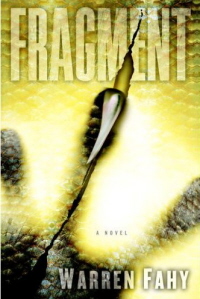Maybe this has happened to you before. You read a book that is pretty good, but instead of enjoying it the way you might, you keep thinking back to another book that did something similar and did it so much better. That is what happened to me as I read Warren Fahy’s first novel, Fragment. I kept thinking of Robert Charles Wilson’s Bios—a bit about Bios later.
Fragment tells of a tiny island in the South Pacific that has never been thoroughly explored, a premise that is highly unlikely in the 21st century. The island is actually a fragment of a lost continent on which evolution took a different turn millions of years back. The result is a place filled with monsters that would likely wipe out the human race if they ever made it to the mainland.
The tale starts on board Trident, a 182-foot exploration ship that is carrying a group of attractive passengers and scientists and a television crew around the world as part of a cable reality show called Sealife. The first few episodes, showing exotic life in remote locales, were popular but the lack of hoped-for romances and excitement has caused ratings to founder.
Circumstances work out so that the Trident makes an unscheduled stop at this tiny island, and, when lots of folks die, interest in the show picks up. The problem is that the government and scientific communities refuse to take the threat seriously, thinking the whole thing is a hoax to strengthen Sealife’s hold on its viewing public.
In the early chapters Fahy goes into great detail describing his characters, but, aside from the main protagonist, plucky botanist Nell Duckworth, they remain pretty flat and most readers will not be too upset when the island monsters gobble up the reality contestants. In fact, it is easy to find yourself cheering for the monsters most of the time. (Maybe this is what Survivor and other reality shows on television are missing.)
Actually, the best characters in the novel are the monsters; the action scenes on the island are exciting and will keep you rapidly turning pages in the middle of the book. Fahy has added illustrations of a couple of those monsters in a fun appendix at the end, but one wonders why he didn’t provide more of them.
The only way to save humanity is a little disappointing—hint: think Day of the Triffids. But there are some surprises as the climax approaches and in the denouement to keep things interesting. In all, Fragment is a pretty good read, and it shows great potential for a debut novelist.
But I kept thinking of Bios.
Robert Charles Wilson won a long overdue Hugo for best novel of 2005 for Spin. But the book he really should have won his first Hugo for was Bios six years earlier. If you have never read the book, go out and get a copy now. Here is a bit about it:
Imagine an earthlike planet that has evolved under only slightly different conditions from Earth’s. The planet, with its lush jungles, rivers and oceans, and animal life, appears inviting. But, on a cellular level, the planet is quite deadly, with literally millions of diseases to which native inhabitants have built up immunities, but which have not even been imagined on Earth.
Thus, when Earth scientists finally discover a very expensive way to send a few scientists light years to the planet Isis, they find everything there, from the water, plants and animals, to the air they breathe, to be incredibly and almost instantaneously, toxic.
In fact, in a moment of dark humor, the two fastidiously maintained and enclosed bases on the planet have been named after “the first identified strains of the hemorrhagic fever that had devastated twenty-first-century Earth”: Yambuku and Marburg.
Zoe Fisher has been genetically fashioned to explore the new planet. Of five cloned sisters, she is the only one who survived the virulent diseases that plague earth in the not-too-distant future. And nano-technological devices have been implanted in her that make her welcome loneliness and isolation. When she is sent to the tiny Yambuku base, she is as ready as she can be.
Politicians of Earth don’t count on two factors: their inability to control human impulses and their lack of understanding of what makes Isis work. First a doctor removes one of the devices that control Zoe’s moods. And, then, Zoe falls in love. As she begins to spend extended periods alone among the flora and fauna, the planet, itself, begins to communicate with her.
When she left Yambuku for her solo trek on Isis, all of its failsafe devices began to fail and lethal molecules seeped into the base, killing the inhabitants in horrible ways. Maybe this is just the planet’s way of saying, “Howdy.” But will Zoe last long enough to recognize the greeting? You’ve got to read this book.
So, if you missed Bios when it came out, read Fragment first. Then read Robert Charles Wilson’s masterpiece about what happens when evolution goes crazy. I wish I had read them in that order.










